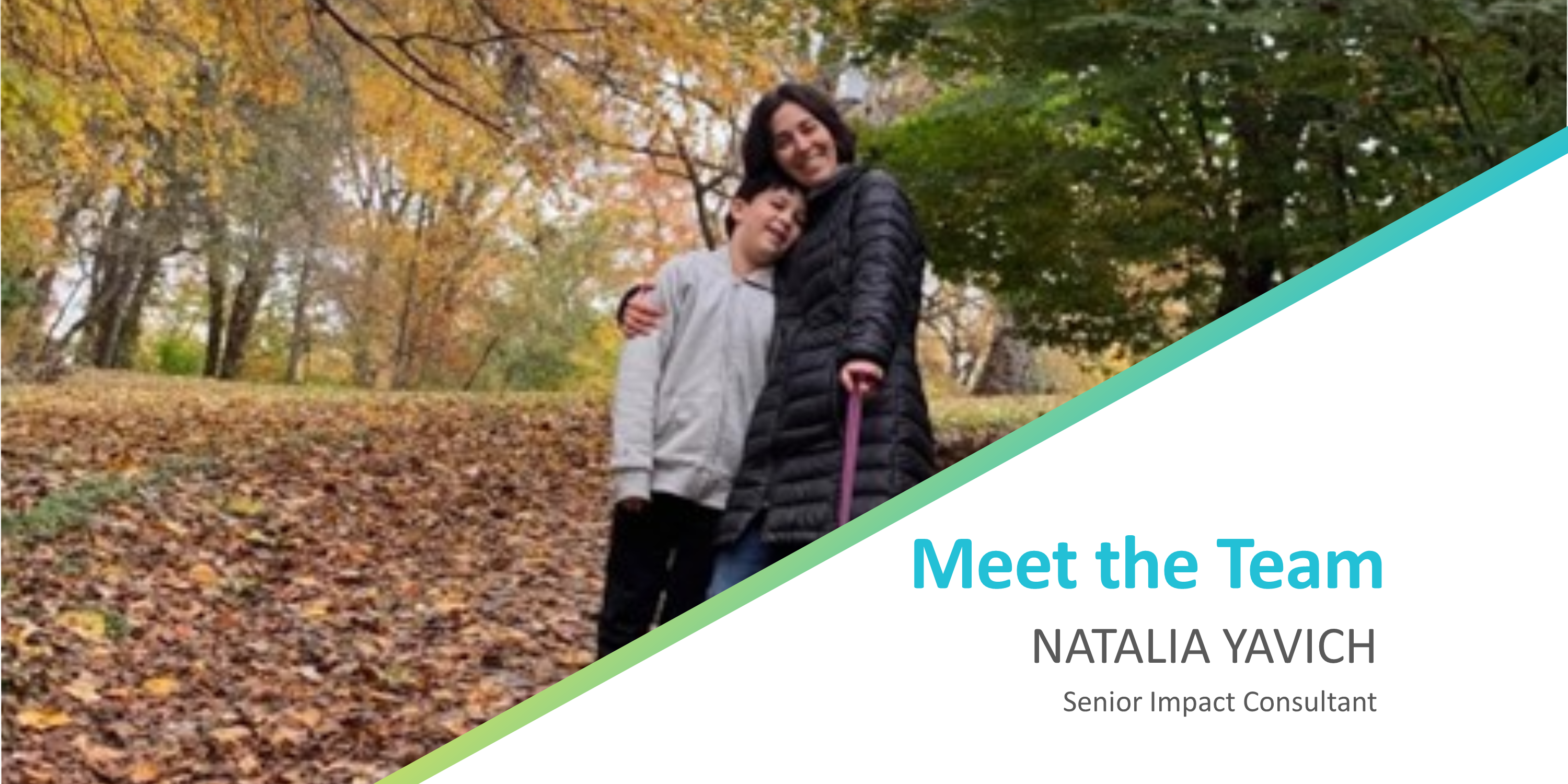Today we want to shine a spotlight Natalia Yavich, Senior Impact Consultant here at ResultsLab, and peek inside her career journey that led her to the evaluation field.
Natalia specializes in evaluation of social and health programs. She believes in using the evaluation process as an opportunity: to gain clarity on what the organization is trying to achieve and how, to improve its effectiveness and performance, to train and motivate the staff, and to engage partners and communities with the organization’s vision. She works with non-profits and governmental organizations to bring strategic and organizational changes to boost equitable access to quality services.
Natalia brings over 20 years of experience in evaluation, research, management and monitoring of programs targeting underserved populations and minorities in the US and Latin America. Natalia led evaluative research projects funded by the International Development Research Centre (IDRC), McGill Institute for Health and Social Policy, UN, Canadian Institutes of Health Research (CIHR), Panamerican Health Organizations, and others. She’s knowledgeable in quantitative and qualitative research methods, and the design of data collection tools. She has leadership experience in academic management of postgraduate programs in health management and public health.
Natalia is trained in Anthropology, holds a Master’s degree in public health, and a Ph. D. in evaluation of systems based on Primary Health Care approaches.
Q: What inspired you to pursue a career in evaluation and data use?
During my late teens and early twenties, I got involved in literacy programs for low-income children and teens mothers. I also got involved in research projects on healthcare access to public services. I felt that so much could have been achieved if the design and provision of services were better aligned with the community’s characteristics and needs.
Q: How have the roles you’ve held in the past contributed to how you work now?
I learned how important it’s to involve stakeholders from the early stages of an evaluation, in a way that’s beneficial to them. To really make an impact with your evaluation it is essential to be sensible and adapt your plan to the organization and stakeholder’s needs, interests, time constraints, challenges and growth opportunities.
Q: What’s your favorite quote/mantra?
“Everything that can be counted does not necessarily count; everything that counts cannot necessarily be counted.”
Albert Einstein
Q: Who would you most like to swap places with for the day?
I would like to experience how it feels to be a genius like Leonardo Da Vinci or to be able to sing like Ella Fitzgerald.
Q: What are your top 3 favorite podcasts/books/blogs to follow?
When I started working in evaluation, I fell in love with Michael Patton’s approach. I’d recommend reading Qualitative Research & Evaluation Methods by him. I’ve read a lot of the books from the Sage Research Methods series.
To disconnect or connect with other worlds, I recommend Åsa Larsson’s crime-fiction novels. She has a very special skill for describing nature and characters’ internal life.
Dav Pilkey’s books are fun to read with your kids, especially “Dog Man”, “Cat Kid Comic Club,” and “Captain Underpants.”
Q: What is something people in your industry/niche have to deal with that you want to fix?
I would like to see more organizations taking advantage of evaluation. My impression is that there are several barriers limiting its use. Below I identify three of them:
- The confusion between reporting or performance measurement with evaluation
- The misconception of evaluation as a punitive practice
- The time constraints and lack of incentives to perform evaluations
I would like to see donors advocating for the development of more comprehensive evaluation frameworks. Those that account for the adequacy and effectiveness of the programs, and help organizations produce data and reports that could potentially be integrated into more holistic evaluation approaches. Evaluation frameworks that fill organizations’ data needs.
Q: What are your hobbies?
Learning about urban agriculture, growing anything that can be harvested, training, yoga, and cooking. I love to spend time with family and friends. I enjoy chatting with my husband about everything and anything, reading, playing, and walking the dog with my son. I also enjoy visiting my daughter at her college, connecting with her, and listening to her experiences.
Q: Tell us something we don’t know about you.
I’m a migrant myself, originally from Argentina. I’m addicted to Yerba Mate – if you work with me, you’ll see me drinking it. Mate is a hot tea that’s very popular in Argentina. People drink it everywhere and at all times. Before COVID, people would get together and drink it from the same cup. It’s a tradition that brings people together.
Thank you, Natalia, for letting us pick your brain and get to know you better. Be on the lookout for our other ResultsLab teammate features in the upcoming months, and be sure to follow us on Facebook and LinkedIn.

